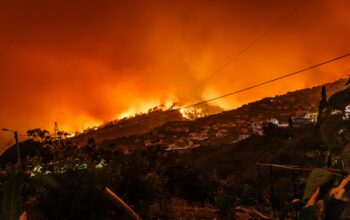Australia. As of January 6, 24 people and almost half a billion animals have died in Australia’s bush fires. Thousands had to be evacuated, almost 2 000 homes and vast amounts of land have been burned and the fires are still raging. A heat wave with a new temperature record followed the driest ever recorded spring contributing to this summer’s fires being particularly destructive. The smoke from the fires has made Sydney air quality one of the worst in the world on some days, and ash and debris threatens to contaminate drinking water, which without significant rain and tighter water restrictions might run out in Sydney by May 2022. The situation confirms scientists’ predictions that climate change will lead to more extreme bush fires, and has put focus on the Australian government, which is influenced by Australia’s mining history and the coal lobby, having failed to cut CO2 emissions. In December, protesters camped outside PM Morrison’s residence in Sydney demanding immediate climate change actions.
European Union. In the end of a decade of heat records, the EU has declared the climate emergency. The declaration includes a call for the Commission to ensure that all proposals are in line with the 1.5°C target, and urges EU member states to cut emissions so that European climate neutrality will be achieved by 2050, to “at least double their contribution to the international Green Climate Fund” and to stop all fossil fuel subsidies by 2020. The symbolic move is supposed to increase pressure on the upcoming European Commission to take a stronger stance in the fight against climate change. Yet, environmental campaigners warn that the declaration is not backed by sufficient action.
United Kingdom. In the UK’s third general election within 4 years, on 12 December 2019, the Conservative Party under the lead of Boris Johnson gained the biggest majority since Thatcher. Johnson had called for early elections in the hope to increase his parties majority in parliament and have his Brexit bill passed so that the UK will be able to leave the EU on 31 January 2020 which now is a likely possibility. The Scottish National Party (SNP) gained seats as well, whereas Northern Ireland’s Democratic Unionist Party (DUP) lost votes so that now, nationalists are outnumbering unionists in Westminster for the first time.
Finland. After two weeks of nationwide postal-led strikes, Antti Rinne (Social Democratic Party) resigned from his post as Prime Minister following criticism voiced by his coalition government of how he handled the strikes. He was replaced by Sanna Marin who now is the world’s youngest serving PM. All five party leaders of the coalition government are women of which four are in their thierties. The government changes might have an impact on the EU as the rotating presidency of the Council of the EU is currently held by Finland putting the country in a central role in establishing the EU budget.
France. The nationwide strike against planned pension reforms that has caused major disruptions mostly to public transport is France’s longest strike since May 1968. Talks between unions and the government are scheduled for 7 January, yet Macron is intend to not back down on his plan that he argues is necessary to make the pension system fairer and more sustainable. Unionists warn that workers will lose out due to an increased age of retirement and decreased payouts. They call for blockades and mass protests from 7 to 10 January.
India. A citizenship law, the Citizenship Amendment Act, which excludes Muslims has sparked mass protests in India. PM Modi’s government has reacted with bans on protests, curfews and the shutdown of internet services. As of 31 December at least 25 people have been killed as police used water cannons, batons and live ammunition against protesters. Dozens were injured and more than 1 500 arrested by 21 December, among the detainees are journalists, activists and intellectuals. Some, however, see a positive development in the reluctance to discuss politics before the protests to a more open conversation about political matters.
USA. House Speaker Pelosi (Democrats) ordered an impeachment inquiry of Trump following allegations that the US president pressured Ukraine’s president to investigate the family of former Vice President Biden. On 18 December, the House voted to impeach Trump on grounds of abuse of power and obstruction of Congress. A two-third majority of the Senate is still required. In the impeachment trial set for January, 20 Republicans would have to vote in favour of the impeachment along with all Democrats for it to go through.
Iran. The year 2020 wasn’t even a week old as the USA carried out an airstike in Baghdad that killed general Soleimani who is seen by many as a hero and revolutionary freedom fighter. Iran reacted by vowing revenge and pulling out of key agreements of the 2015 nuclear deal that the USA had already pulled out of in 2018. Trump, on the other hand, claimed to have acted to prevent a war and described Soleimani as “terrorist number 1”. He tweeted, the USA would attack 52 Iranian sites if Iran retaliated.
Photo Credits
pi-IMG_5623, zhrefch, CC0 1.0





